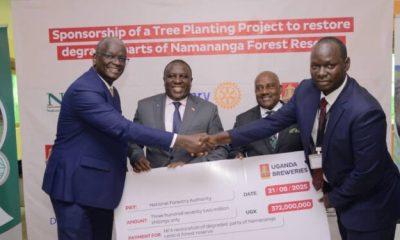Conservation
Ugandan Oil Refinery Project Urged to Continue Despite French Environmental Protests
The development of Uganda’s much-anticipated oil refinery should continue unabated, Global Advisor at HYRAX OIL, Haji Habib Kagimu, has urged, dismissing recent protests by French environmental activists against the project.
Speaking on Thursday during a dialogue between the Uganda Manufacturers Association (UMA) and the Uganda National Oil Company (UNOC) at the UMA Multipurpose Hall, Kagimu emphasised that the project stakeholders are well aware of environmental responsibilities.
“I have nothing against these French environmental demonstrators, but we are not stupid. We know what we want and we are mindful of the environment because we need it; it’s not the environment that needs us,” Kagimu said.
Kagimu, who is also the Honorary Consul of Malaysia to Uganda, highlighted the economic necessity of the refinery, noting that Uganda stands to earn far more by adding value to its crude oil locally rather than selling it unprocessed. He drew parallels with the coffee sector, where Uganda has historically lost revenue by exporting unprocessed beans and importing processed coffee.
Citing Malaysia’s experience, Kagimu noted, “They have moved ahead because they produce the equivalent of 750,000 barrels of gas and 100,000 barrels of crude oil. Using money from these two products, Malaysia has its National Petroleum Company called Petronas, an equivalent of the Uganda National Oil Company (UNOC).”
He applauded the government’s plan to construct the refinery using capital from shareholders and well-wishers, without loans, urging stakeholders to seize the opportunity.
The dialogue also featured UMA Chairman Aga Sekala Jr., who underscored the strategic importance of the refinery and the Kabalega Petro-Based Industrial Park for Uganda’s manufacturing sector.
“We are at the cusp of first oil production, and this is a critical opportunity to forge a collaborative path forward. With an estimate of 6.5 billion barrels of oil reserves, of which 1.4 billion barrels are recoverable, and 600 billion standard cubic feet of gas, we foresee our industries augmented and powered by the oil and gas sector, from inputs to energy,” Sekala said.
He added that while Uganda’s manufacturing sector contributes 16% to GDP, creates two million jobs, consumes 70% of electricity, and accounts for 21% of exports, it is still operating below full capacity at 54%. The refinery, he suggested, could help boost these figures by providing both energy and raw materials for industrial growth.
As Uganda moves closer to the first oil production, officials are optimistic that the refinery will not only enhance local economic gains but also position the country for long-term industrial development.
Comments



























